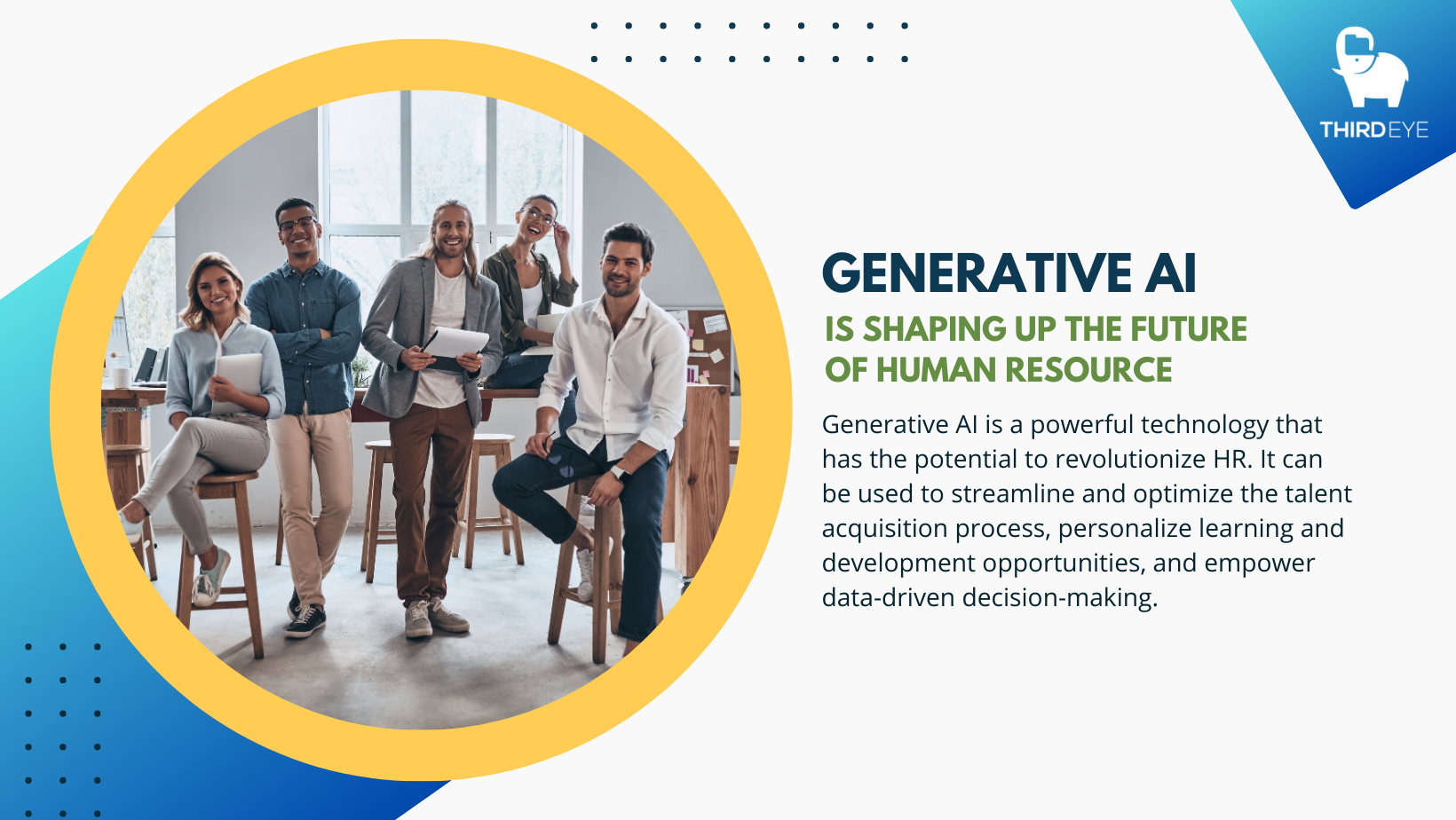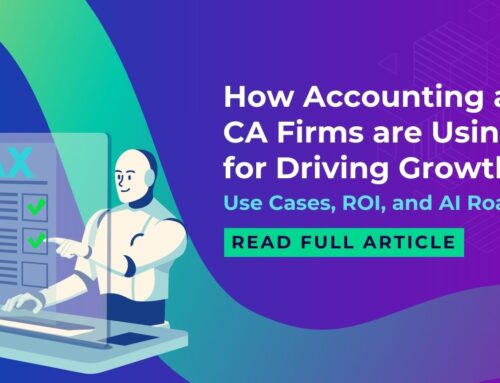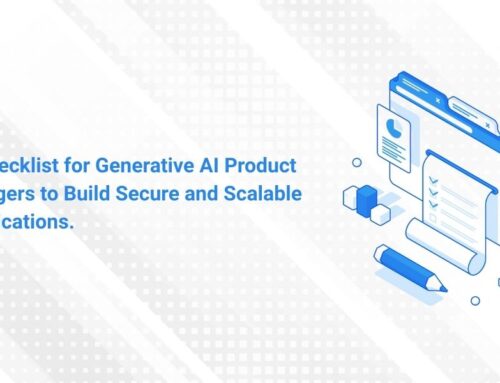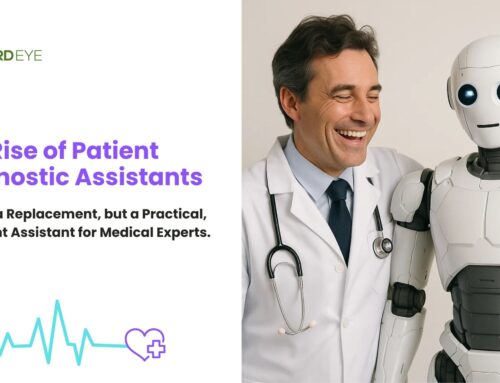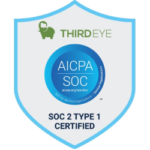Unleashing the Power of Generative AI in Shaping the Future of HR
The field of Human Resources (HR) plays a pivotal role in driving organizational success through talent management, employee engagement, and strategic workforce planning. In today’s fast-paced digital landscape, traditional HR practices are undergoing a transformative shift due to cutting-edge technologies. Among these technologies, Generative AI stands out as a powerful tool with the potential to revolutionize HR by enhancing decision-making, streamlining processes, and unlocking the full potential of human capital. In this blog post, we will explore the profound impact of Generative AI on the future of HR and its implications for organizations.
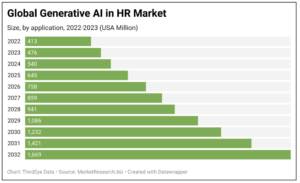
Figure: Global Generative AI in HR Market (Size)
In the above chart, we can observe the growth of the global Generative AI in the HR market from 2022 to 2032. The market size is represented in millions of dollars (USD) each year. The data indicates a steady upward trend, with significant growth expected throughout the forecast period. By 2032, the market is estimated to reach a substantial value of 1,669 million USD, reflecting the increasing adoption and recognition of Generative AI’s potential in transforming HR practices worldwide.
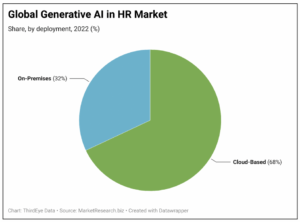
Figure: Global Generative AI in HR Market (Share by Deployment)
In the above data on the global Generative AI in HR market share by deployment in 2022, we can see that cloud-based deployment holds the majority with a share of 68%. On the other hand, on-premises deployment accounts for the remaining 32%. This indicates that organizations are increasingly adopting cloud-based solutions for implementing Generative AI in their HR practices, leveraging the flexibility, scalability, and accessibility offered by cloud technologies.
What Generative AI Means for HR
Transforming Talent Acquisition:
Talent acquisition is a complex and time-consuming process that HR professionals grapple with. Generative AI can streamline and optimize this process through the use of natural language processing and machine learning algorithms. By analyzing job descriptions, resumes, and social media profiles, AI-powered systems can help identify suitable candidates more efficiently and accurately, saving time and reducing bias in the hiring process.
Augmenting Employee Experience:
Enhancing employee experience is crucial for attracting and retaining top talent. Generative AI can play a pivotal role in personalizing learning and development opportunities, providing timely feedback, and offering tailored career paths. By leveraging machine learning algorithms, HR professionals can gain insights into employees’ preferences, strengths, and areas for improvement, leading to customized training programs and career development plans.
Empowering Data-Driven Decision-Making
Data-driven decision-making is becoming increasingly crucial in HR. Generative AI can analyze large volumes of data, including employee performance metrics, engagement surveys, and sentiment analysis, to uncover patterns, trends, and correlations. By harnessing this valuable information, HR teams can make informed decisions related to performance management, succession planning, and employee well-being.
Fostering Diversity and Inclusion
Diversity and inclusion are vital aspects of modern HR strategies. Generative AI can assist HR professionals in mitigating unconscious bias during the recruitment and selection process. By employing AI algorithms, organizations can design fair and unbiased hiring processes, ensuring equal opportunities for all candidates.
What Generative AI Means for Recruiters
Generative AI holds immense potential for recruiters, revolutionizing the way they approach talent acquisition and candidate engagement. With the power of natural language processing and machine learning, Generative AI enables recruiters to analyze vast amounts of data, including job descriptions, resumes, and social media profiles. This technology streamlines the talent acquisition process by automating resume screening, matching candidate profiles to job requirements, and even predicting candidate success based on historical data. Recruiters can save time, improve efficiency, and make more informed decisions. Additionally, Generative AI-powered chatbots and virtual assistants provide personalized engagement with candidates, offering real-time interaction, answering questions, and providing guidance throughout the recruitment journey. This enhances candidate experience, boosts employer brand, and ultimately helps recruiters find the best talent for their organizations.
What it Means for Professional Growth
Generative AI has significant implications for professional growth, both for individuals and organizations. As this technology becomes more prevalent in the workplace, professionals must adapt and embrace its potential to thrive in their careers.
- Skill Development: With the integration of Generative AI in various industries, there is an increasing demand for professionals with expertise in AI-related fields. Employees who acquire skills in machine learning, natural language processing, and data analysis will be highly sought after and have greater opportunities for career advancement.
- Job Creation: As Generative AI continues to evolve, it will create new job roles and career paths within organizations. Professionals who can effectively leverage AI tools to solve complex problems and optimize processes will be instrumental in driving innovation and success.
- Enhanced Decision-making: Generative AI’s ability to process and analyze vast amounts of data can significantly improve decision-making across all levels of an organization. Professionals who can harness the power of AI-driven insights will be better equipped to make strategic choices, leading to improved outcomes and career growth.
- Creativity and Innovation: Generative AI can automate repetitive tasks, freeing up time for professionals to focus on more creative and innovative aspects of their work. This technology can inspire new ideas and solutions, enabling professionals to bring fresh perspectives to their roles and contribute to organizational growth.
- Continuous Learning: As Generative AI continues to advance, professionals must embrace a culture of continuous learning to stay relevant and competitive in their industries. Adapting to the latest AI trends and acquiring new skills will be essential for long-term career growth.
- Job Satisfaction: When AI is utilized to handle repetitive tasks, professionals can devote more time to tasks that align with their passions and strengths. This increased job satisfaction can lead to higher productivity, better performance, and greater opportunities for career advancement.
- Collaboration with AI: Rather than seeing AI as a threat to job security, professionals should view it as a powerful ally. Collaborating with AI-driven systems can enhance productivity and efficiency, allowing professionals to focus on tasks that require human expertise and emotional intelligence.
What’s new for the performance review
The integration of Generative AI technology is revolutionizing the traditional performance review process. With real-time performance tracking, managers can continuously monitor and analyze employee performance based on various data sources. This objective evaluation minimizes bias and ensures fair assessments. Generative AI also enables data-driven feedback and recommendations by analyzing performance data, helping managers provide personalized guidance for improvement. The interactive and dynamic nature of AI-powered systems enhances employee engagement during performance reviews. Additionally, Generative AI supports the shift towards continuous performance management, fostering ongoing feedback and development discussions. Overall, Generative AI brings benefits such as improved accuracy, reduced bias, increased employee engagement, and enhanced performance outcomes to the performance review process.
Bias and other risks
While there are numerous positive intentions and potential applications of generative AI, it is essential to acknowledge and address the risks associated with this technology. One such risk involves the inadvertent propagation of biases inherited from historical data. Generative AI learns from past patterns, which often reflect historical biases. Consequently, if AI-driven tools are solely relied upon for decision-making, these biases can be amplified. However, it is crucial to approach this risk as part of a broader discussion on the responsible and ethical use of generative AI. By proactively considering and mitigating these risks, we can harness the transformative power of generative AI while safeguarding against unintended consequences.
Furthermore, there are risks associated with the implementation of the technology itself. It is important to incorporate risk assessment and management early in the workflow design process. Leaders and organizations need to carefully consider how the technology will impact job roles, workflows, and collaboration models. Without proper change management, the additional time saved through AI automation may not be effectively directed toward value-added activities.
It is also crucial to recognize the role of government regulation, policy, and international standards in addressing the risks associated with generative AI. While the private sector plays a significant role in developing and implementing AI technologies, self-regulation may not be sufficient. Government oversight and societal frameworks are essential to ensure the responsible and ethical use of AI to prevent potential misuse or harm.
In summary, addressing risks related to bias, creativity, workflow design, and regulation is crucial when deploying generative AI. It is necessary to approach the technology with a proactive mindset, considering potential risks from the outset and ensuring that AI systems are used in a manner that aligns with ethical and societal considerations.
Harnessing the Power: Embracing the Potential of Generative AI in HR
As organizations embark on their journey with generative AI in HR, there are several key points to consider when it comes to harnessing its power and embracing its potential:
- Enhanced Decision-Making: Generative AI empowers HR professionals with advanced analytics and data-driven insights. By leveraging AI algorithms, organizations can make more informed and accurate decisions in areas such as talent acquisition, performance management, and workforce planning. The ability to analyze vast amounts of data enables HR teams to identify patterns, trends, and predictive indicators, leading to better strategic decision-making.
- Process Optimization: Generative AI has the potential to streamline and optimize HR processes. Automated systems can handle repetitive tasks, such as resume screening, candidate shortlisting, and scheduling interviews, freeing up HR professionals’ time for more strategic and value-added activities. These efficiency gains can significantly improve HR operational effectiveness and productivity.
- Personalized Employee Experiences: Generative AI can enable personalized employee experiences by leveraging individual data and preferences. AI-powered systems can provide tailored learning and development recommendations, career path suggestions, and personalized coaching, enhancing employee engagement and satisfaction. This personalization fosters a more inclusive and employee-centric workplace culture.
- Uncovering Hidden Insights: With generative AI, HR professionals can unlock valuable insights from unstructured data sources such as employee feedback, social media, and sentiment analysis. By extracting meaningful patterns and sentiment analysis from these data sources, organizations can gain a deeper understanding of employee sentiments, engagement levels, and overall organizational climate. This knowledge can drive targeted interventions, enhance employee well-being, and strengthen the employee experience.
- Ethical and Inclusive AI Practices: Embracing generative AI in HR requires a strong focus on ethical and inclusive practices. Organizations must ensure that AI systems are designed and trained to mitigate biases and uphold fairness in decision-making. Regular audits, diverse datasets, and ongoing monitoring are essential to address any unintended biases and ensure equitable treatment of employees throughout HR processes.
- Human-AI Collaboration: While generative AI brings powerful capabilities, it is crucial to maintain a balance between human judgment and AI-driven insights. HR professionals should view AI as a tool to augment their expertise rather than replace it. By embracing a collaborative approach, HR teams can leverage the strengths of both AI and human judgment, leading to more effective and well-informed HR strategies and outcomes.
Conclusion
Generative AI presents a transformative opportunity for the field of HR, revolutionizing decision-making, optimizing processes, and enhancing employee experiences. By harnessing the power of generative AI, organizations can unlock valuable insights, make data-driven decisions, and create a more personalized and inclusive workplace environment. However, it is important to approach generative AI with a proactive mindset, addressing the potential challenges and risks associated with bias, transparency, and ethical considerations.
In this journey, ThirdEye Data can serve as a valuable partner. As a leading provider of AI solutions and services, ThirdEye Data offers expertise in developing and deploying generative AI solutions tailored to HR needs. Their deep understanding of AI technologies, data analytics, and ethical AI practices positions them as trusted advisors in navigating the complexities of generative AI in HR. By leveraging ThirdEye Data’s expertise, organizations can ensure responsible AI implementation, address bias mitigation, optimize workflows, and drive successful outcomes.


